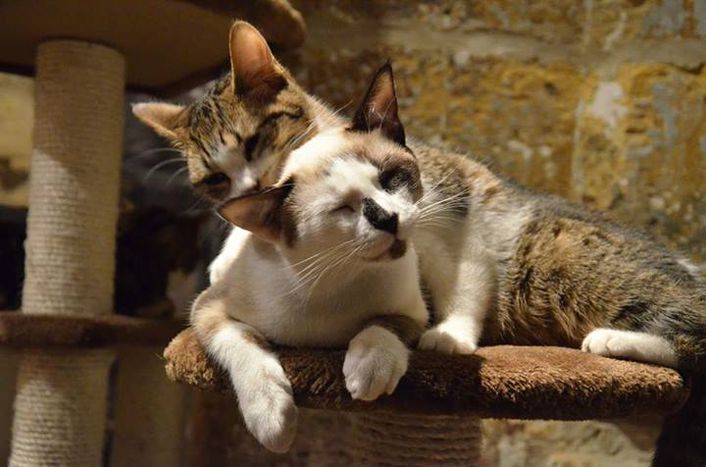
The Paris Cat Café: Le Café Des Chats
Published on
I have never been so fond of cats. They are the animal equivalent of the gold digger, all take take take. Or perhaps the prostitute provides a better analogy; cats let people touch them for material gain, but for food rather than cash. I prefer the authentic fidelity of the canis familiaris. But I am very open-minded to say the least, so I went to the Café des Chats in Paris’ 3rd arrondissement
Upon entering the cat café I am told to cleanse my hands with vicious smelling antiseptic. Normally this is what you do after touching animals, not before. The implication is that the humans are dirtier than the cats. Fortunately I have a thick skin and I’m not offended. I’m told that touching sleeping cats is forbidden.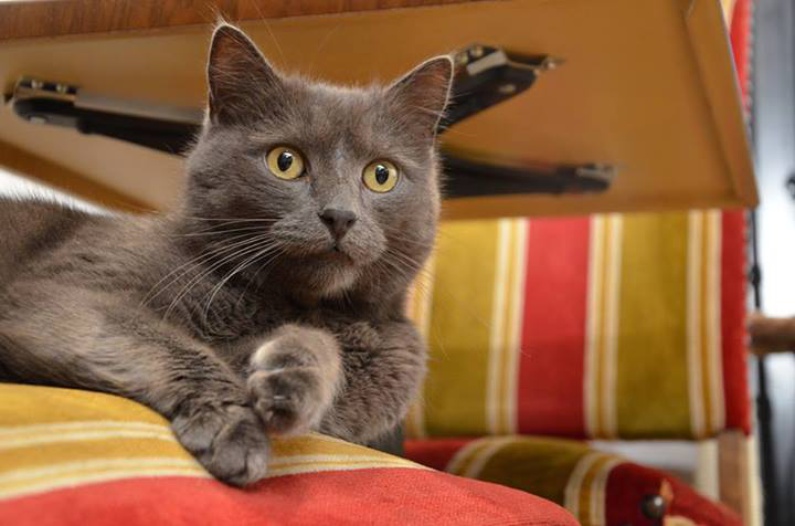
I descend a staircase to a warmly lit cavern. It seems to have been hewn directly from the bedrock of Paris. A cosy dungeon of sorts. A few cats sleep serenely in wall-mounted nests. One is lying on a table being rubbed by a family. Another drinks tea from a bearded man’s mug. It feels like being in the internet.
But what interests me most is not the cats but the humans. What kind of person takes their coffee with a cat?
I gaze around at the customers and I can’t help but think they’re the real animals round here. The cats sleep peacefully or slink around elegantly. The humans blunder about, bumping into each other, whooping with excitement. Two young men decide that if they can’t touch the sleeping cats, they’ll wake them up so they can touch them. One cat is sleeping by a piano. The lads hammer the keys, an awful sound is emitted, the cat awakes and they whisk it away triumphantly.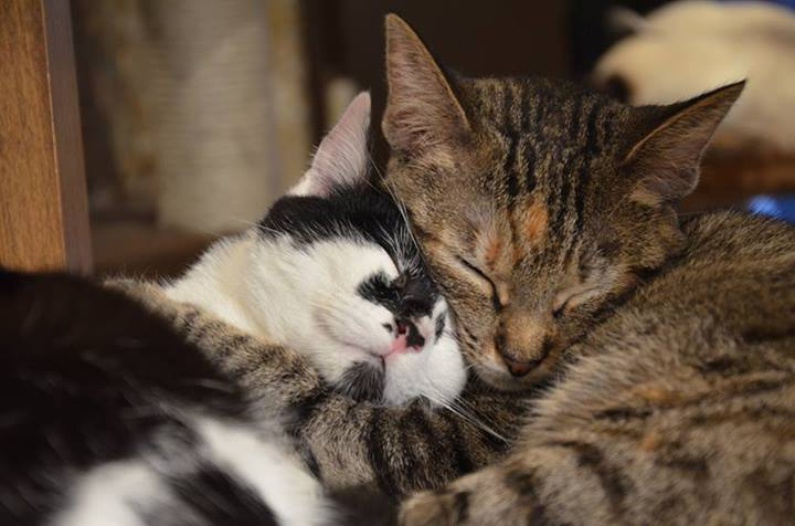
An Algerian named Ali is sitting in the corner. He’s 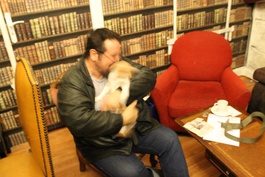 large and alone but his smile is immense. He explains how cats have different cultural significance in different countries. “In certain parts of Africa they burn a cat for good luck when someone leaves for afar,” says Ali. But in his native Algeria, “cats come and go as they please. They even go into the mosques.” Ali tells me that when he was younger, he argued with his father because he would not let their cat eat at the dinner table, “so I took a table to my room and I would dine in there with the cat. He had his little dish next to me, we ate together.” Why did he come to the Café des Chats? He takes out a newspaper clipping from his pocket, showing me the advert which inspired his visit. Then he gets up to find himself a cat, charging off enthusiastically like a bull in a china shop.
large and alone but his smile is immense. He explains how cats have different cultural significance in different countries. “In certain parts of Africa they burn a cat for good luck when someone leaves for afar,” says Ali. But in his native Algeria, “cats come and go as they please. They even go into the mosques.” Ali tells me that when he was younger, he argued with his father because he would not let their cat eat at the dinner table, “so I took a table to my room and I would dine in there with the cat. He had his little dish next to me, we ate together.” Why did he come to the Café des Chats? He takes out a newspaper clipping from his pocket, showing me the advert which inspired his visit. Then he gets up to find himself a cat, charging off enthusiastically like a bull in a china shop.
Cats, like babies, palliate the pain and embarrassment of inadequate social interactions. If there is a baby or an animal around, awkward silences are dealt with by the touching of said creature. You can interact without talking. You don’t even need to have anything in common, you just touch the creature and smile at each other, bonding over the third party presence. For some customers, this is the role the cats play. Small groups sit in silence gazing indulgently at the cat on their table.
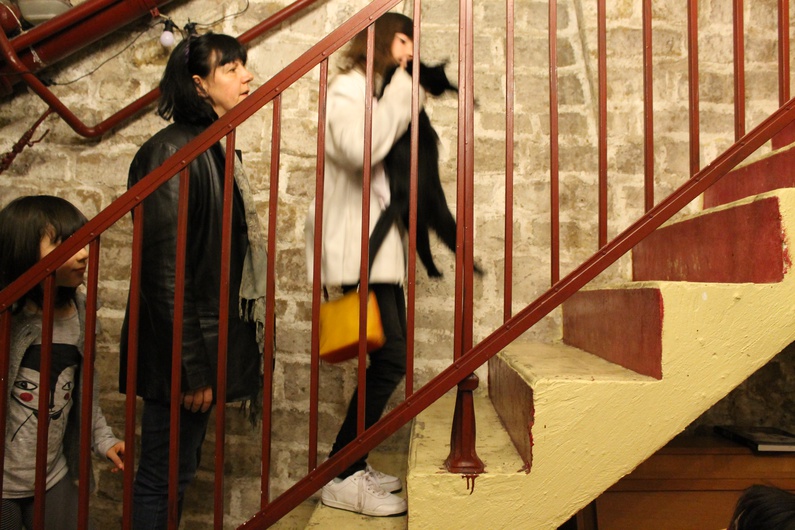 Puss in Boots would turn in his grave if he saw these ferocious, finely constructed killing machines curled up on sofas, selling their bodies in an underground cavern in Paris. There is a curious tension between the cat’s construction and the cat's daily reality. House cats lead double lives, ruthlessly hunting birds and tearing mice to pieces, before returning home to have their ears scratched whilst they sleep. A human who behaved this way would be branded a schizophrenic psychopath. The other customers don’t seem to think so.
Puss in Boots would turn in his grave if he saw these ferocious, finely constructed killing machines curled up on sofas, selling their bodies in an underground cavern in Paris. There is a curious tension between the cat’s construction and the cat's daily reality. House cats lead double lives, ruthlessly hunting birds and tearing mice to pieces, before returning home to have their ears scratched whilst they sleep. A human who behaved this way would be branded a schizophrenic psychopath. The other customers don’t seem to think so.
Two American girls are in the thick of the action, scurrying around, joyously chasing down the limited supply of cats. I drag them away from the chase to hear their thoughts. Why did they come to the Café des Chats? “Because cats are the cutest things!” Why are they cute? “Because they’re so cute!” exclaims, Sarah, 21. I marvel at the American talent for truisms. “They’re very cute,” Sarah continues, “and they are really soft. And they are comforting. They just like to relax and lounge around which is totally the atmosphere you should have in a cozy café like this. They set the right mood for chilling out and enjoying life.”
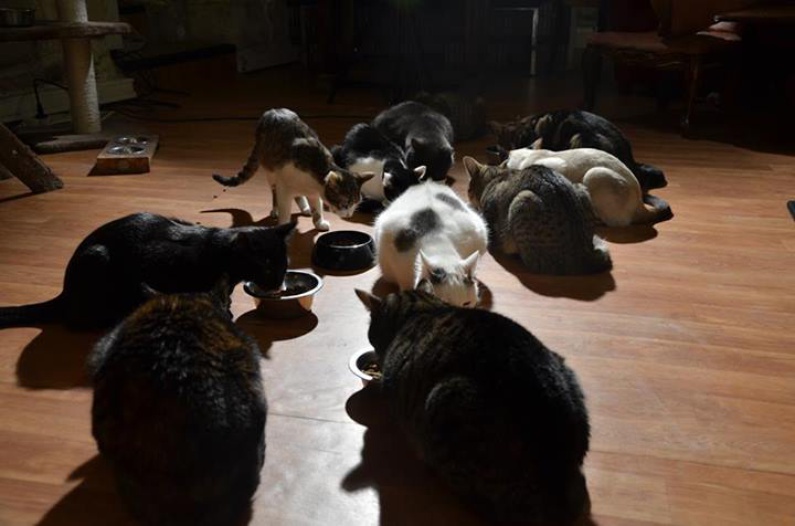 Sarah’s words prove to be quite astute. Nicole, another customer at the Café des Chats tells me about the unique therapeutic power of animals. “In prisons they do dog therapy,” she says, “and some of the prisoners say ‘if I didn’t have 5 minutes a day with a dog, I would have already killed myself.’” Animals are increasingly being used in prisons in a therapeutic capacity, helping inmates overcome emotional traumas. Indeed “animal assisted therapy” is a recognised treatment for drug addicts. Are the customers at the Café des Chats unknowingly engaging in emotional therapy?
Sarah’s words prove to be quite astute. Nicole, another customer at the Café des Chats tells me about the unique therapeutic power of animals. “In prisons they do dog therapy,” she says, “and some of the prisoners say ‘if I didn’t have 5 minutes a day with a dog, I would have already killed myself.’” Animals are increasingly being used in prisons in a therapeutic capacity, helping inmates overcome emotional traumas. Indeed “animal assisted therapy” is a recognised treatment for drug addicts. Are the customers at the Café des Chats unknowingly engaging in emotional therapy?
What can the Café des Chats tell us about the state of society? Is it a symptom of our obsession with sensual stimuli? Materialism in its rawest form? Instead of stimulating the brain with a newspaper, today’s coffee drinker stimulates his/her body with a cat. The sensual replaces the cerebral. Or perhaps the Café des Chats is a symptom of the loneliness inherent in the human condition, a loneliness which is accentuated by the social fragmentation of the modern metropolis. As we live ever closer together, we seem to grow ever further apart. Perhaps animals can help us overcome this alienation? Or perhaps the café is a by-product of an economic crisis that has robbed us of the resources to keep our own cats, whilst ramping up our craving for comforting cuddles and unbridled affection?
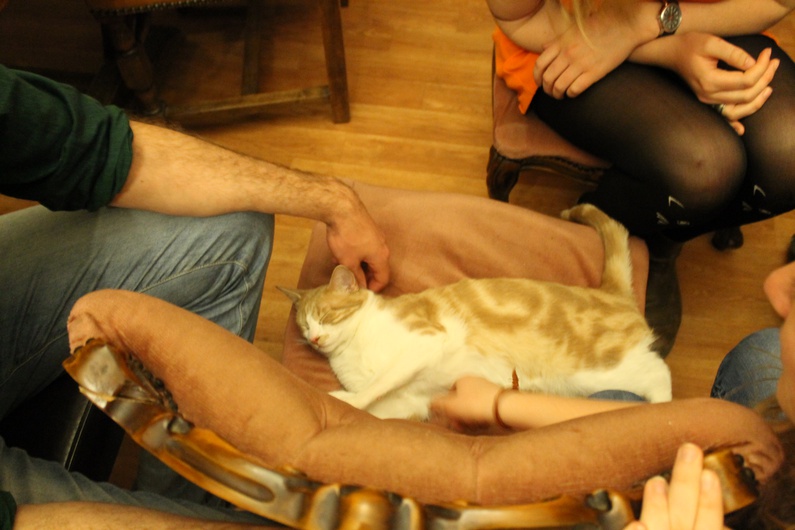 As I reach for my wallet, I am struck by the awful indignity these cats must endure (or would endure if they were Marxist cats). The indignity of being man handled by strangers who neither know them nor want to; “Your softness for my euros.” This is not a social relationship between fellow creatures; it is an economic relationship whereby a subject becomes an object of economic value, commodity fetishism, reification pure and ugly. But Samantha, one of the café’s employees, allays my fears. She says the cats are under no pressure to perform; “sometimes they decide to sleep all day… they only go to the customers when they want to.” It’s a symbiotic relationship whereby cats and customers share the emotional booty. No time soon will I dance with a cat by the light of the moon, but my preconceptions about them have changed.
As I reach for my wallet, I am struck by the awful indignity these cats must endure (or would endure if they were Marxist cats). The indignity of being man handled by strangers who neither know them nor want to; “Your softness for my euros.” This is not a social relationship between fellow creatures; it is an economic relationship whereby a subject becomes an object of economic value, commodity fetishism, reification pure and ugly. But Samantha, one of the café’s employees, allays my fears. She says the cats are under no pressure to perform; “sometimes they decide to sleep all day… they only go to the customers when they want to.” It’s a symbiotic relationship whereby cats and customers share the emotional booty. No time soon will I dance with a cat by the light of the moon, but my preconceptions about them have changed.



